The prestigious FIFA Master course at De Montfort University Leicester (DMU) has a truly global reputation - not just for its teaching but because of the calibre of students who come from all over the world to study there.
So, it was only right that marking the 20th anniversary of a course, which was named Europe’s number one postgraduate sports management degree in 2019, should have an international feel to it.
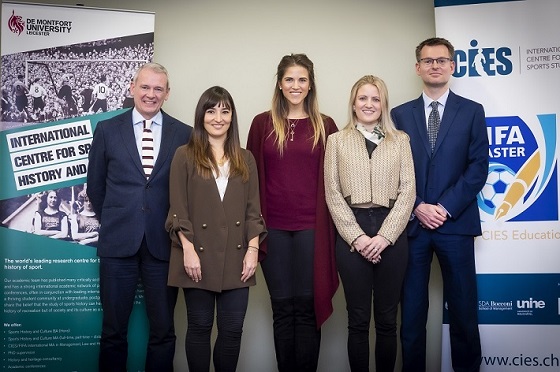
Prof Polley, Sara Panizo, Marianne Cornejo, Kirsty Burrows & James Panter
As a result, three alumnae, who qualified from the course over the last few years, took part in a Q&A focussing on Female Leadership in International Sport, drawing on their own experiences of entering a heavily male dominated sector in different parts of the globe.
Graduates Kirsty Burrows, Managing Director of Sports Rights Solutions - who advises the International Olympic Committee on the prevention of harassment and abuse in sport, Sara Panizo, who works for FIFA in Zurich overseeing development projects in the Americas, and Marianne Cornejo, International Motorsports Junior Manager for Red Bull, were invited back to DMU to lead the discussion.
Chaired by Professor Martin Polley, Director of DMU’s International Centre for Sports History and Culture (ICSHC), a huge range of topics were covered, including the panel’s own experiences as a female leader in the sporting world, the politics of Donald Trump, the way the media portrays women in sport, and even the implications of having grid girls and boys in motorsport.
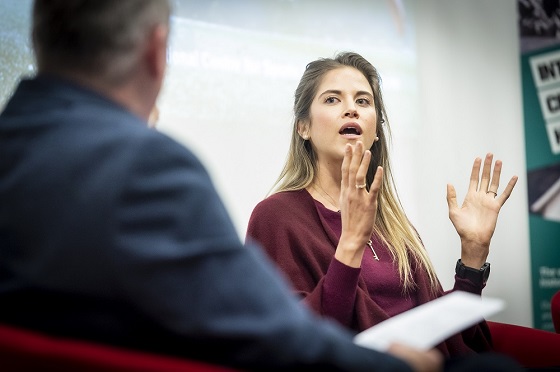
Marianne Cornejo discusses her role with Red Bull Jr Motorsport
Marianne explained how she works with 13 to 17-year-olds as they develop their skills with Red Bull and enter the professional ranks.
Asked for ways the gender gap could be improved in sport, Marianne said: “People do not realise how early on issues start for women in sport. My focus is on rider development. Just three per cent of 13-to-17-year-old riders that make it to a level when they are on our horizon are female. They have already faced years of discrimination and a lack of encouragement.
RELATED NEWS
FIFA Master named best course in Europe for the seventh year
How Sanaa is changing the face of football refereeing
Be inspired. Come to the next DMU Open Day
“We need to start addressing these issues when the problems start, which is very, very early on.
“Secondly, we are really being stupid by cutting out women and children in sport. They have huge marketing power and we are saying ‘no thanks’ to it? It does not make business sense. It is not a woman’s issue, it is a sports issue and it affects everyone.”
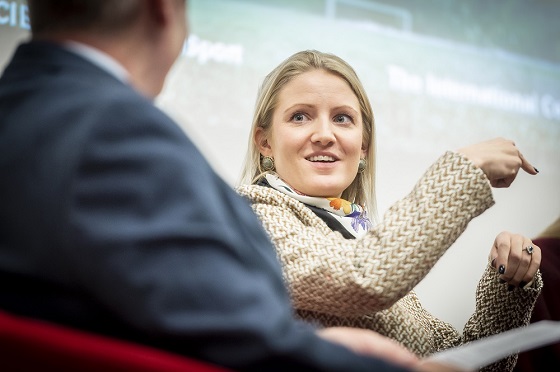
Kirsty Burrows, MD of Sports Rights Solutions
Kirsty said there was no one-stop solution to the issue.
She said: “To talk about gender equality, you need men at the table as well. Within the boardroom, you do not get much diversity. To try and empower women to enter the boardroom, people look for quick answers such as quotas. But it has to be lots of factors from across sport that are addressed.
“One of the issues we are dealing with is long-term cultures and environments that must change, but there is no overnight solution. We need to make small changes across different areas which will lead to more women and girls having opportunities.
“What words do we use when referring to sports people? Do we say ‘he was powerful’ and ‘she is beautiful’? We need to look at how we portray women’s sport as a whole. We need to look at funding, we also need buy-in from the very top. We have some great men in sport doing this but we need women too. And to improve accessibility and support we need good mentors.”
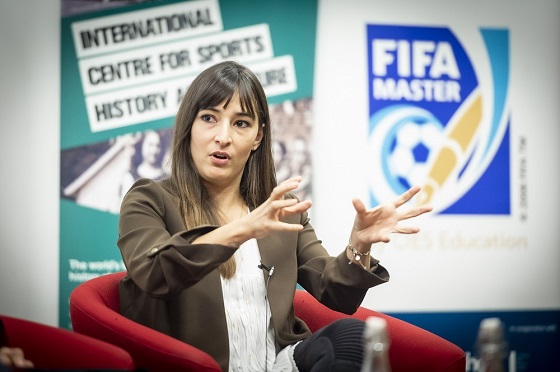
Sara oversees development projects in the Americas for FIFA
Sara said she was the only woman in a team of nine looking after sports development across the Americas, from Canada down to Chile, but it meant she could bring something different to the table.
After pointing out that FIFA offered incentives for federations to invest in the women’s game, she said: “My experience as a woman in football is I can have a different way of thinking and viewing things which is sometimes the opposite of what my colleagues have,” she explained.
“And the integration of these two ways of thinking means we can grow as an organisation and put so many more ideas onto the table.”
The issue of calling people out in the #MeToo era was also tackled.
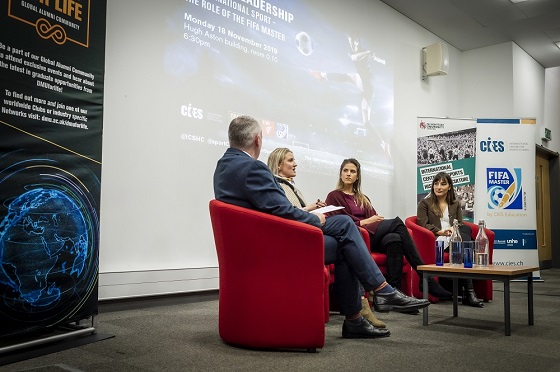
The Q&A gets underway at DMU with Professor Polley chairing
Marianne said: “For a woman going into sports management I would say there is a way to call out a stereotype or injustice and it is to not be hostile, and you should not have to worry about it being something that will come back and haunt you.
“This approach is very powerful. It takes the pressure off you and puts it back on the person who is in the wrong. But I must admit it has taken me a lot of time to learn that.”
Talking before the event, all three women said they were excited to be back in Leicester and see the DMU campus.
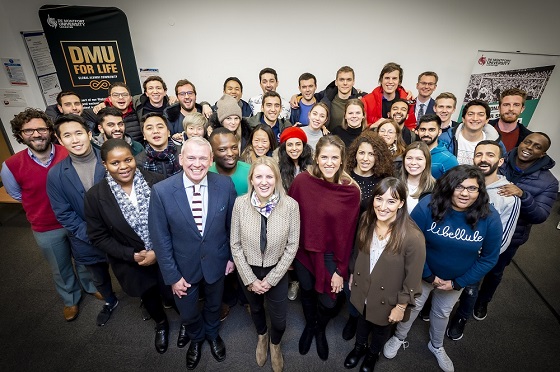
The panel with the current cohort and staff from the FIFA Master at DMU
Kirsty said: “It’s so nice to se everyone again. The FIFA Master becomes part of your identity and the people are part of your family. The course has been hugely influential. I would not be where I am now without it…and now I am back at DMU where it all began.”
The FIFA Master - International Master in Management, Law and Humanities of Sport (MA) – is overseen by the International Centre for Sports Studies (CIES) in Switzerland and is jointly delivered by DMU, SDA Bocconi School of Management in Milan, Italy, and the University of Neuchâtel in Switzerland. It has been named Europe’s number one postgraduate sports management degree seven times.
The event was supported by the FIFA Master Alumni Association, DMU for Life and DMU Women.
It was also promoting DMU’s commitment to the UN Sustainable Development Goals. Numbers four and five of the 17 goals to achieve a better future by 2030 focus on Quality Education and Gender Equality.
Posted on Wednesday 20 November 2019